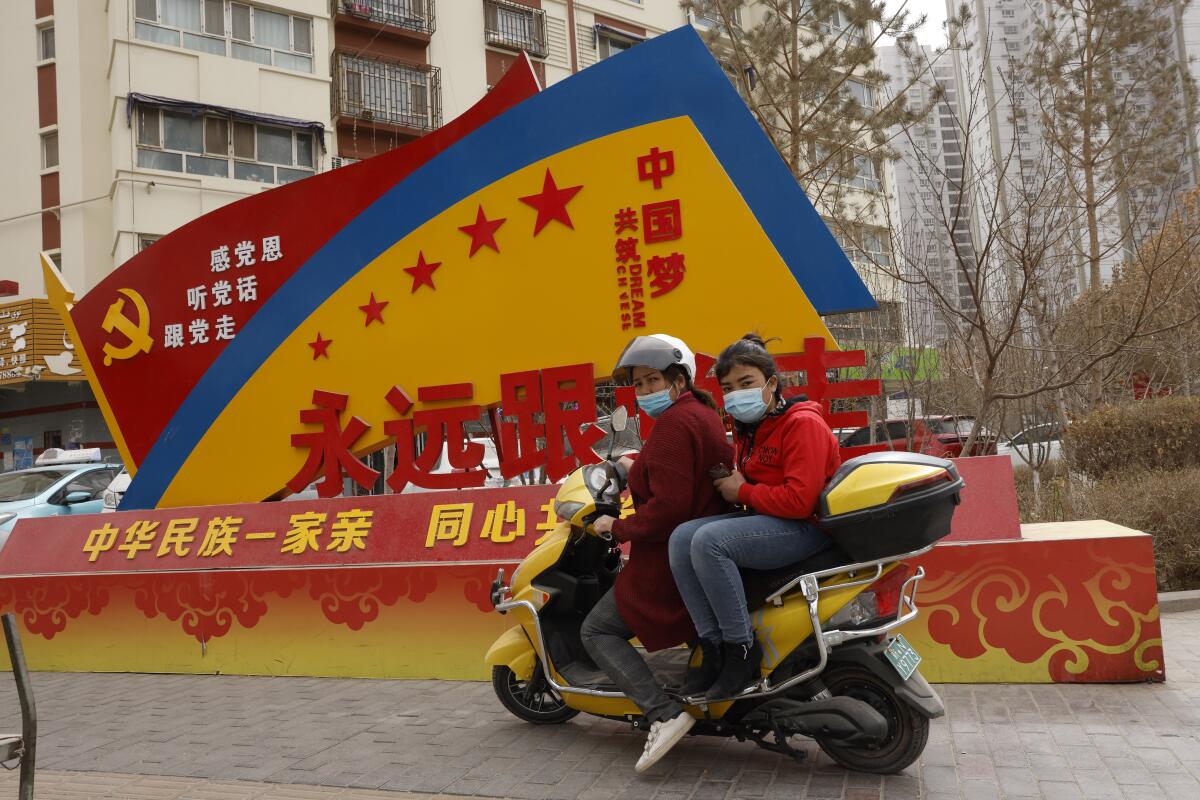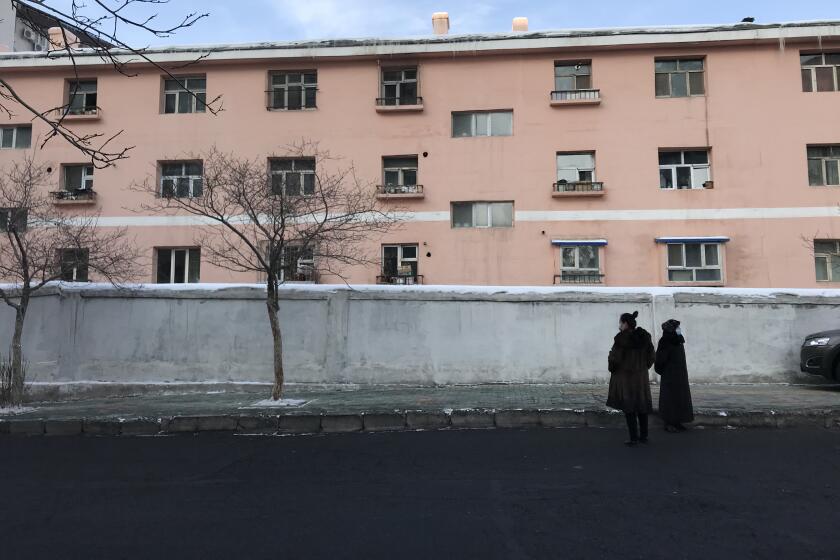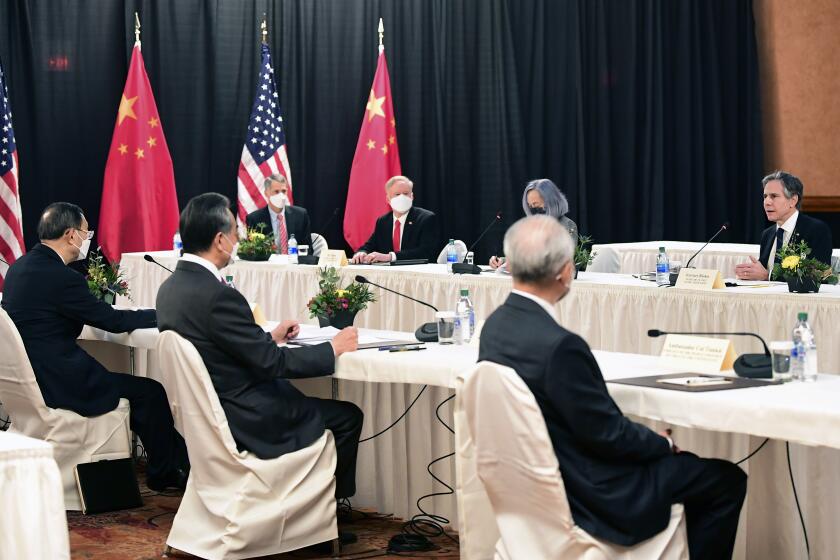China sanctions Britons in retaliation for joint U.K., U.S. move over Xinjiang

BEIJING — China announced sanctions on British individuals and entities Friday in retaliation for the U.K.’s participation with the U.S. and European Union in sanctioning Chinese officials over human rights abuses in Xinjiang.
A statement from the Chinese Foreign Ministry said the move by Britain, alongside other Western nations, was based on “nothing but lies and disinformation, flagrantly breaches international law and basic norms governing international relations, grossly interferes in China’s internal affairs, and severely undermines China-U.K. relations.”
Britain’s ambassador to China had been summoned for a diplomatic protest, the statement said. The sanctioned British individuals and groups would be barred from visiting Chinese territory and banned from conducting financial transactions with Chinese citizens and institutions.
China’s sanctions are the latest move in an increasingly bitter row over Xinjiang, where Beijing is accused of detaining more than 1 million members of Uyghur and other Muslim minority groups, using forced labor and imposing coercive birth-control measures.
At a daily news briefing, Foreign Ministry spokesperson Hua Chunying unleashed a torrent of accusations against the U.S., the U.K., allied nations and portions of the Western media, saying they had been collaborating to undermine China’s unity and development.
Sanctions against Chinese officials over Xinjiang are part of an elaborate plot to destabilize the region and do not reflect any real concern for the rights of Muslims, Hu said, adding that Beijing’s response was necessary to “defend China’s interests and dignity.”
A vast system of Chinese surveillance, detention, cultural erasure and forced labor has devastated the Uighur people in Xinjiang, their homeland.
“For a lengthy period of time, the U.S., U.K and others have felt free to say whatever they like without allowing others to do the same,” Hua said. Those days are over, and the West will “have to gradually get used to it,” Hua said.
The latest sanctions and the harsh tone of Hua’s comments reflect China’s increasingly tough stance under President Xi Jinping, who has pledged to uphold China’s interests at any cost. In recent days, China has blocked already highly limited BBC broadcasts into the country and put two Canadians on trial on spying charges in apparent retaliation for Canada’s detention of a senior Huawei executive.
China has rejected all criticism over its policies in Xinjiang, along with its crackdown on opposition figures in Hong Kong and its threats against Taiwan, the self-governing island that China claims as its own territory. Beijing has shrugged off U.S. sanctions on Chinese officials accused of squelching democracy in Hong Kong and angrily denounced a British plan to offer a path to residency and citizenship to millions of citizens of its former colony.
Hua opened her briefing with a video clip of a former aide to retired Secretary of State Colin Powell saying the American military presence in Afghanistan, which shares a narrow border with China, was partly an effort to thwart Beijing’s rise. She also named the National Endowment for Democracy and the CIA as working covertly to sow instability.
Rather than a race to build warheads, this competition involves an infrastructure race, a GDP race and debates over whose political system is better.
British Foreign Secretary Dominic Raab denounced the sanctions and urged Chinese authorities to allow representatives from the United Nations into Xinjiang to “verify facts” if it wants to “credibly rebut claims of human rights abuses.” China says diplomats are welcome in the region but only under Beijing-imposed conditions.
China “sanctions its critics,” in contrast to Britain and other nations that “sanction human rights abuses,” Raab said.
Nine British individuals and four institutions were placed on the sanctions list, including Iain Duncan Smith, a member of Parliament, and the ruling Conservative Party’s Human Rights Commission. Duncan Smith is a former leader of the Conservatives.
On Thursday, Chinese state TV called for a boycott of Swedish retail chain H&M as Beijing lashed out at foreign clothing and footwear brands following Monday’s decision by the 27-nation EU, the U.S., Britain and Canada to impose travel and financial sanctions on four Chinese officials blamed for abuses in Xinjiang. Cotton and other agricultural products form a major component of the local economy in vast but thinly populated Xinjiang.
News Alerts
Get breaking news, investigations, analysis and more signature journalism from the Los Angeles Times in your inbox.
You may occasionally receive promotional content from the Los Angeles Times.
Companies including Nike and Burberry that have well-established presences in China were also targeted online, with some Chinese celebrities saying they were severing endorsement deals.
“China is firmly determined to safeguard its national sovereignty, security and development interests, and warns the U.K. side not go further down the wrong path. Otherwise, China will resolutely make further reactions,” the Foreign Ministry said.
Others on the Foreign Ministry sanctions list included politicians, scholars and human rights activists and organizations. Among them were the China Research Group, established by a group of Conservative lawmakers, the independent research group Uyghur Tribunal and the Essex Court Chambers, a law firm that described Chinese policies toward minorities in Xinjiang as crimes against humanity and genocide.
Xinjiang’s Communist-run provincial government issued a lengthy statement touting economic growth, political stability and population increase in the region and pointing to violence and violations of human rights in the U.S., Britain, Canada and elsewhere and the chaos brought by military interventions in Iraq and Libya.
“Any plot to to undermine Xinjiang’s prosperity and development ... will certainly be doomed to shameful failure,” the statement said.
More to Read
Sign up for Essential California
The most important California stories and recommendations in your inbox every morning.
You may occasionally receive promotional content from the Los Angeles Times.












